Foundation Year Project: Sustainability Challenges for UK Business
VerifiedAdded on 2023/06/15
|10
|1989
|369
Project
AI Summary
This foundation year research project investigates the challenges faced by the UK's business and tourism industry in ensuring sustainability and future expansion, focusing on Trailfinders as a case study. The project aims to identify the conceptual framework of sustainability and its impact on the UK tourism industry, determine the challenges hindering sustainable practices and expansion, and recommend ways for Trailfinders to mitigate these challenges. Using qualitative research methods and secondary data, the study analyzes the benefits and obstacles of sustainable tourism, including ecological sustainability, communication issues, and seasonality. The findings emphasize the importance of sustainability for environmental protection, community well-being, and the long-term growth of tourism companies. The research concludes that the UK tourism industry can enhance its sustainability efforts by educating travelers, collaborating with the government, and engaging local communities, ultimately contributing to a more sustainable and economically viable future.
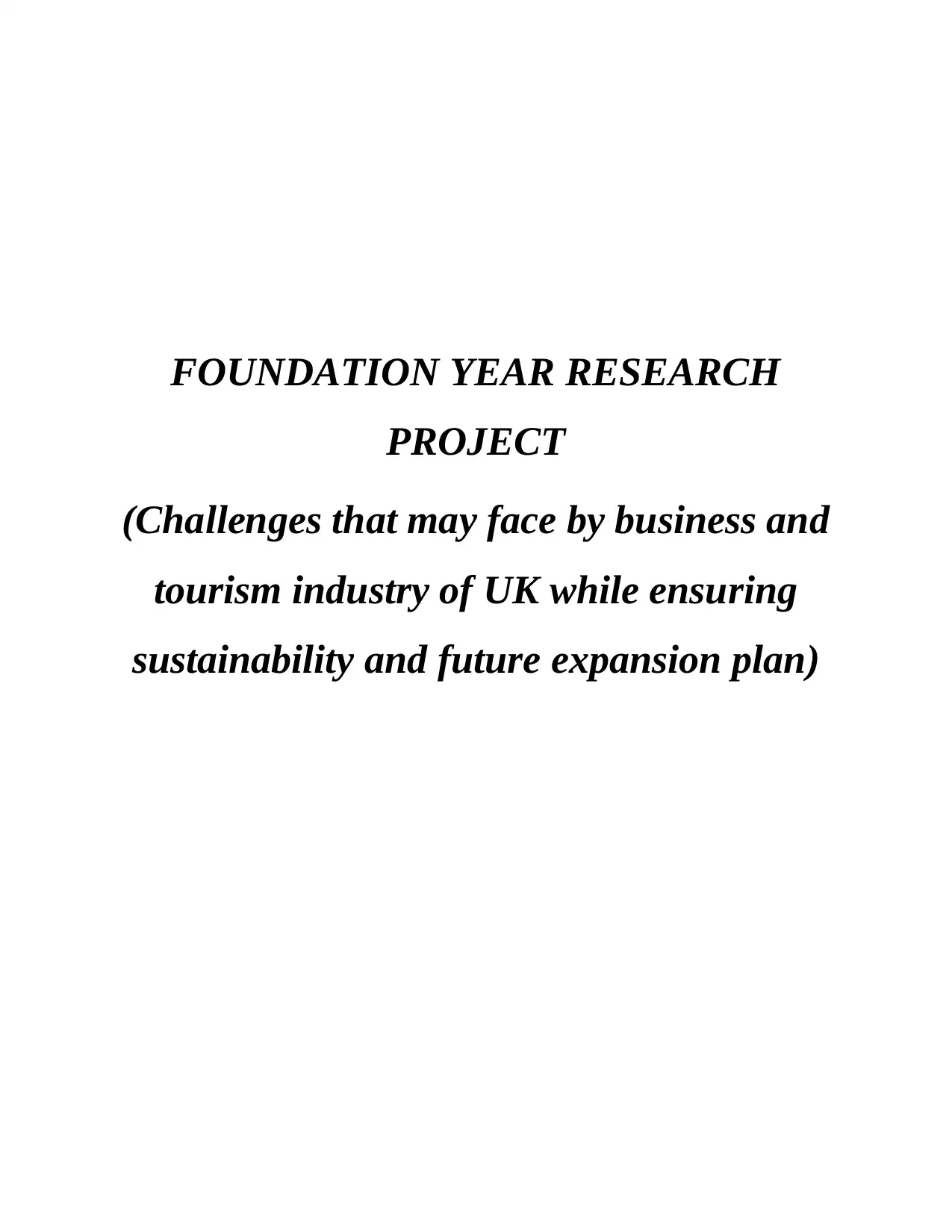
FOUNDATION YEAR RESEARCH
PROJECT
(Challenges that may face by business and
tourism industry of UK while ensuring
sustainability and future expansion plan)
PROJECT
(Challenges that may face by business and
tourism industry of UK while ensuring
sustainability and future expansion plan)
Paraphrase This Document
Need a fresh take? Get an instant paraphrase of this document with our AI Paraphraser
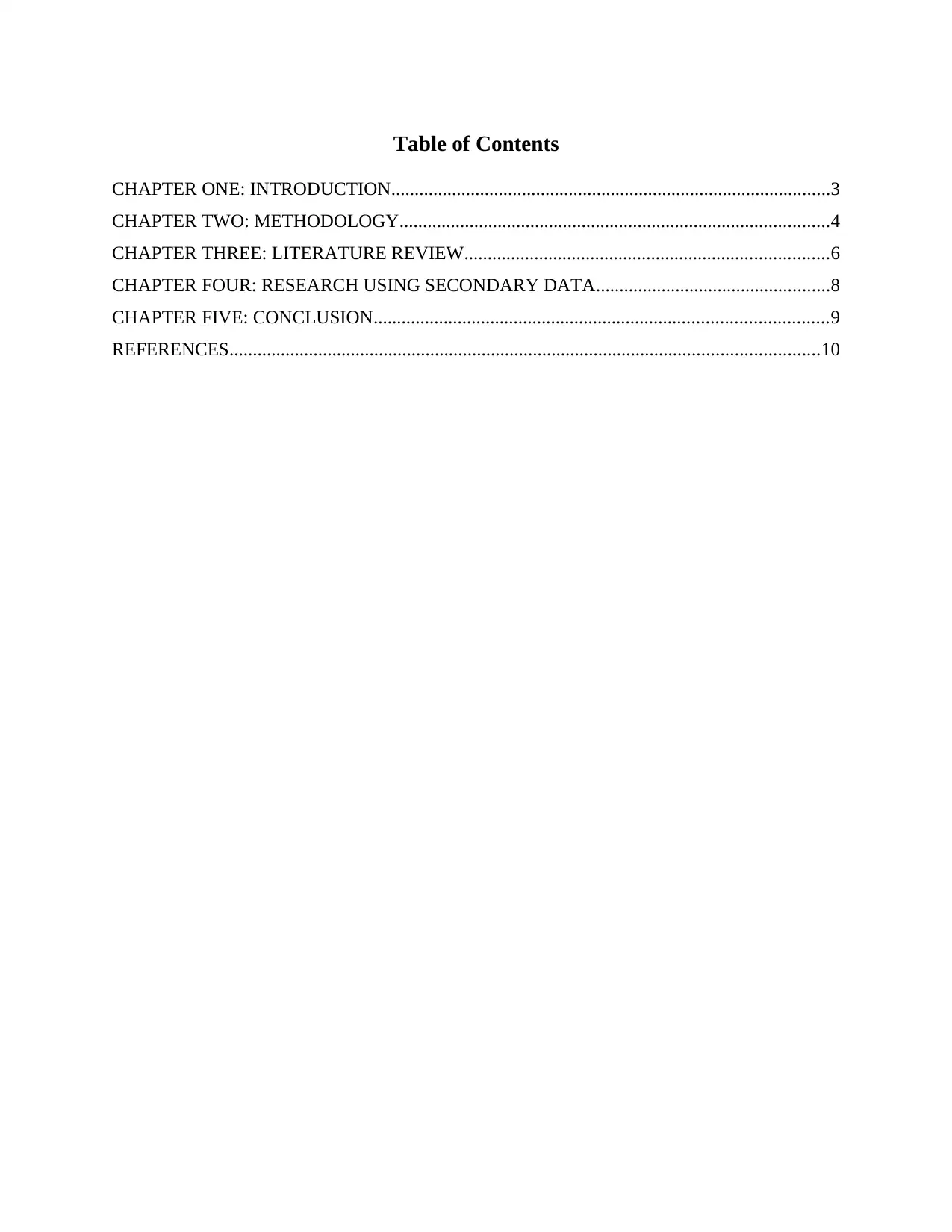
Table of Contents
CHAPTER ONE: INTRODUCTION..............................................................................................3
CHAPTER TWO: METHODOLOGY............................................................................................4
CHAPTER THREE: LITERATURE REVIEW..............................................................................6
CHAPTER FOUR: RESEARCH USING SECONDARY DATA..................................................8
CHAPTER FIVE: CONCLUSION.................................................................................................9
REFERENCES..............................................................................................................................10
CHAPTER ONE: INTRODUCTION..............................................................................................3
CHAPTER TWO: METHODOLOGY............................................................................................4
CHAPTER THREE: LITERATURE REVIEW..............................................................................6
CHAPTER FOUR: RESEARCH USING SECONDARY DATA..................................................8
CHAPTER FIVE: CONCLUSION.................................................................................................9
REFERENCES..............................................................................................................................10
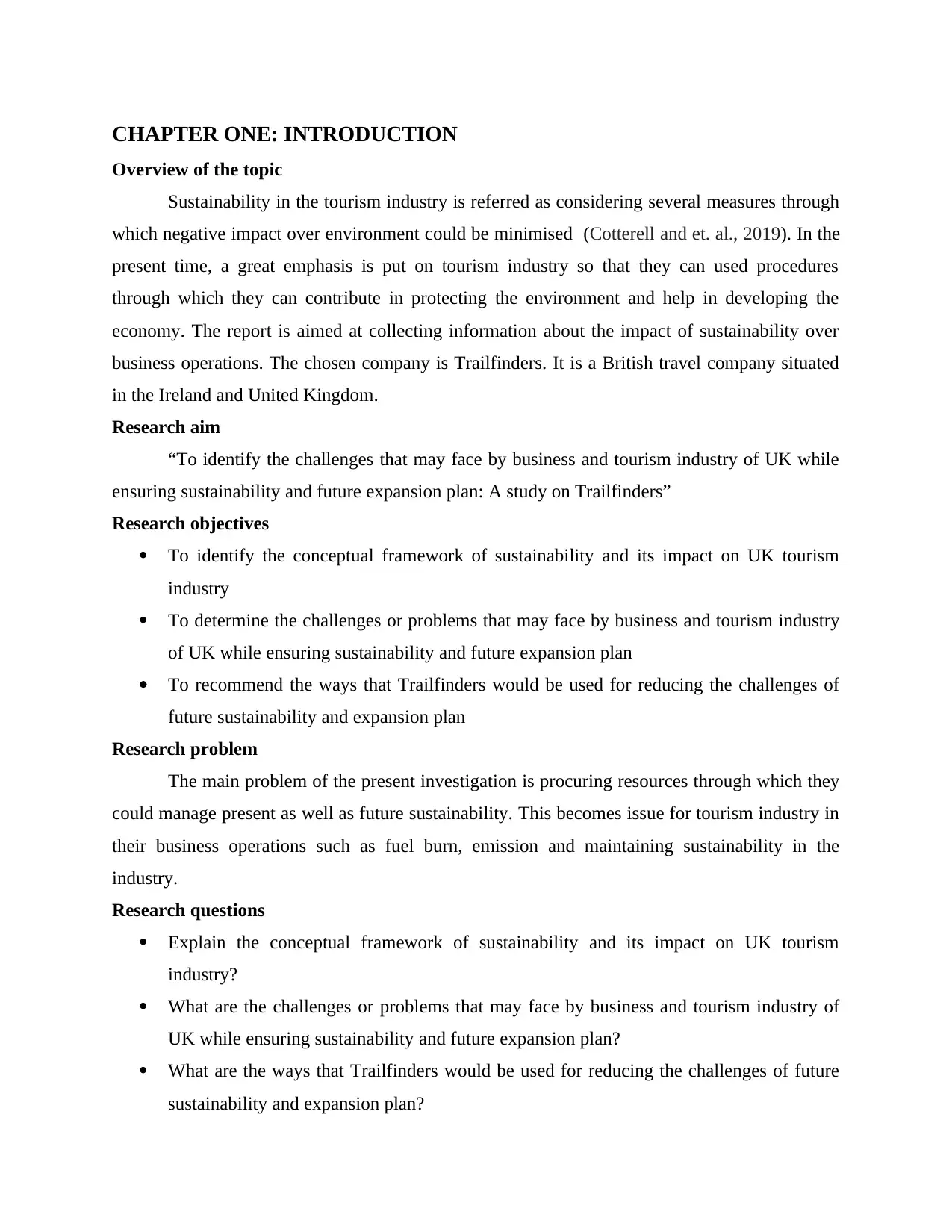
CHAPTER ONE: INTRODUCTION
Overview of the topic
Sustainability in the tourism industry is referred as considering several measures through
which negative impact over environment could be minimised (Cotterell and et. al., 2019). In the
present time, a great emphasis is put on tourism industry so that they can used procedures
through which they can contribute in protecting the environment and help in developing the
economy. The report is aimed at collecting information about the impact of sustainability over
business operations. The chosen company is Trailfinders. It is a British travel company situated
in the Ireland and United Kingdom.
Research aim
“To identify the challenges that may face by business and tourism industry of UK while
ensuring sustainability and future expansion plan: A study on Trailfinders”
Research objectives
To identify the conceptual framework of sustainability and its impact on UK tourism
industry
To determine the challenges or problems that may face by business and tourism industry
of UK while ensuring sustainability and future expansion plan
To recommend the ways that Trailfinders would be used for reducing the challenges of
future sustainability and expansion plan
Research problem
The main problem of the present investigation is procuring resources through which they
could manage present as well as future sustainability. This becomes issue for tourism industry in
their business operations such as fuel burn, emission and maintaining sustainability in the
industry.
Research questions
Explain the conceptual framework of sustainability and its impact on UK tourism
industry?
What are the challenges or problems that may face by business and tourism industry of
UK while ensuring sustainability and future expansion plan?
What are the ways that Trailfinders would be used for reducing the challenges of future
sustainability and expansion plan?
Overview of the topic
Sustainability in the tourism industry is referred as considering several measures through
which negative impact over environment could be minimised (Cotterell and et. al., 2019). In the
present time, a great emphasis is put on tourism industry so that they can used procedures
through which they can contribute in protecting the environment and help in developing the
economy. The report is aimed at collecting information about the impact of sustainability over
business operations. The chosen company is Trailfinders. It is a British travel company situated
in the Ireland and United Kingdom.
Research aim
“To identify the challenges that may face by business and tourism industry of UK while
ensuring sustainability and future expansion plan: A study on Trailfinders”
Research objectives
To identify the conceptual framework of sustainability and its impact on UK tourism
industry
To determine the challenges or problems that may face by business and tourism industry
of UK while ensuring sustainability and future expansion plan
To recommend the ways that Trailfinders would be used for reducing the challenges of
future sustainability and expansion plan
Research problem
The main problem of the present investigation is procuring resources through which they
could manage present as well as future sustainability. This becomes issue for tourism industry in
their business operations such as fuel burn, emission and maintaining sustainability in the
industry.
Research questions
Explain the conceptual framework of sustainability and its impact on UK tourism
industry?
What are the challenges or problems that may face by business and tourism industry of
UK while ensuring sustainability and future expansion plan?
What are the ways that Trailfinders would be used for reducing the challenges of future
sustainability and expansion plan?
⊘ This is a preview!⊘
Do you want full access?
Subscribe today to unlock all pages.

Trusted by 1+ million students worldwide
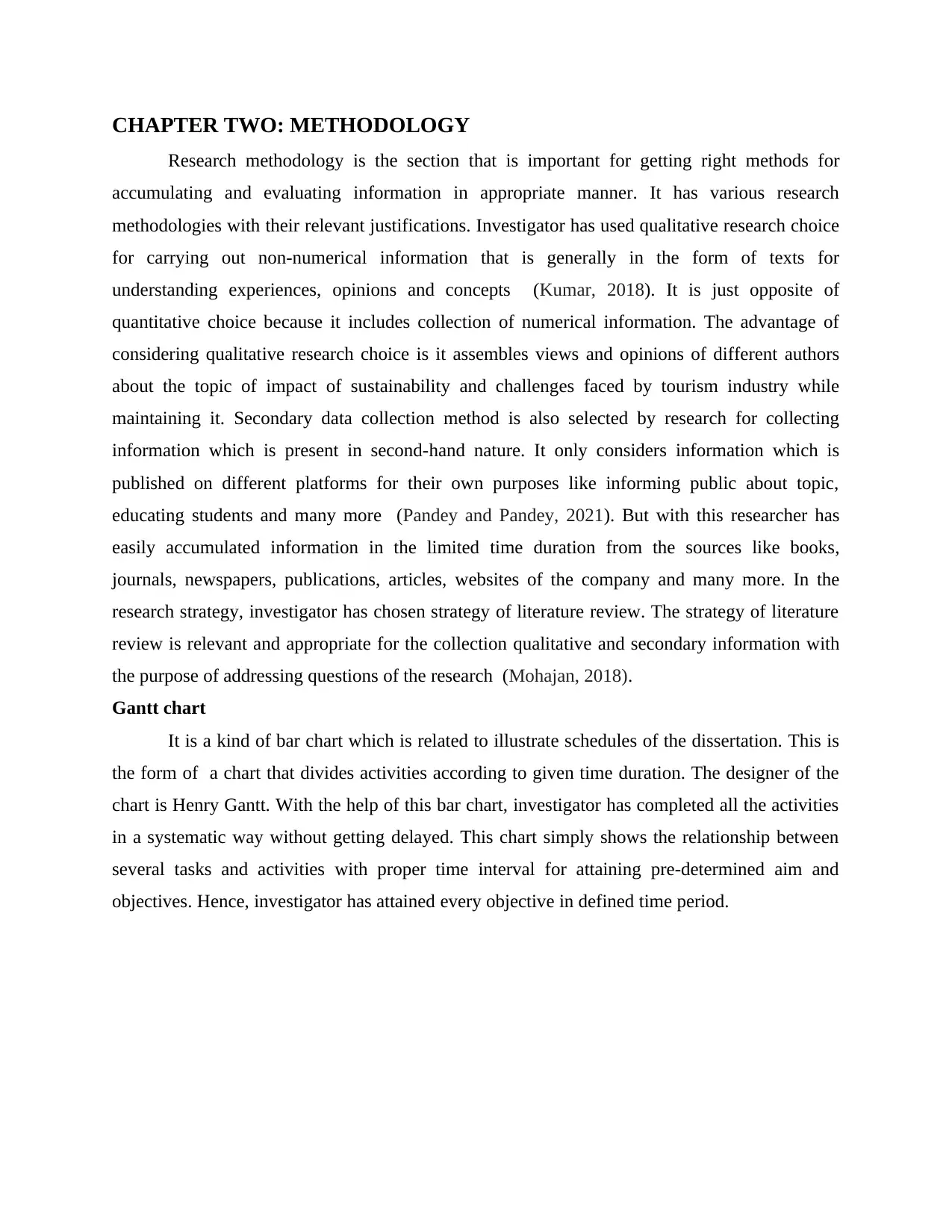
CHAPTER TWO: METHODOLOGY
Research methodology is the section that is important for getting right methods for
accumulating and evaluating information in appropriate manner. It has various research
methodologies with their relevant justifications. Investigator has used qualitative research choice
for carrying out non-numerical information that is generally in the form of texts for
understanding experiences, opinions and concepts (Kumar, 2018). It is just opposite of
quantitative choice because it includes collection of numerical information. The advantage of
considering qualitative research choice is it assembles views and opinions of different authors
about the topic of impact of sustainability and challenges faced by tourism industry while
maintaining it. Secondary data collection method is also selected by research for collecting
information which is present in second-hand nature. It only considers information which is
published on different platforms for their own purposes like informing public about topic,
educating students and many more (Pandey and Pandey, 2021). But with this researcher has
easily accumulated information in the limited time duration from the sources like books,
journals, newspapers, publications, articles, websites of the company and many more. In the
research strategy, investigator has chosen strategy of literature review. The strategy of literature
review is relevant and appropriate for the collection qualitative and secondary information with
the purpose of addressing questions of the research (Mohajan, 2018).
Gantt chart
It is a kind of bar chart which is related to illustrate schedules of the dissertation. This is
the form of a chart that divides activities according to given time duration. The designer of the
chart is Henry Gantt. With the help of this bar chart, investigator has completed all the activities
in a systematic way without getting delayed. This chart simply shows the relationship between
several tasks and activities with proper time interval for attaining pre-determined aim and
objectives. Hence, investigator has attained every objective in defined time period.
Research methodology is the section that is important for getting right methods for
accumulating and evaluating information in appropriate manner. It has various research
methodologies with their relevant justifications. Investigator has used qualitative research choice
for carrying out non-numerical information that is generally in the form of texts for
understanding experiences, opinions and concepts (Kumar, 2018). It is just opposite of
quantitative choice because it includes collection of numerical information. The advantage of
considering qualitative research choice is it assembles views and opinions of different authors
about the topic of impact of sustainability and challenges faced by tourism industry while
maintaining it. Secondary data collection method is also selected by research for collecting
information which is present in second-hand nature. It only considers information which is
published on different platforms for their own purposes like informing public about topic,
educating students and many more (Pandey and Pandey, 2021). But with this researcher has
easily accumulated information in the limited time duration from the sources like books,
journals, newspapers, publications, articles, websites of the company and many more. In the
research strategy, investigator has chosen strategy of literature review. The strategy of literature
review is relevant and appropriate for the collection qualitative and secondary information with
the purpose of addressing questions of the research (Mohajan, 2018).
Gantt chart
It is a kind of bar chart which is related to illustrate schedules of the dissertation. This is
the form of a chart that divides activities according to given time duration. The designer of the
chart is Henry Gantt. With the help of this bar chart, investigator has completed all the activities
in a systematic way without getting delayed. This chart simply shows the relationship between
several tasks and activities with proper time interval for attaining pre-determined aim and
objectives. Hence, investigator has attained every objective in defined time period.
Paraphrase This Document
Need a fresh take? Get an instant paraphrase of this document with our AI Paraphraser

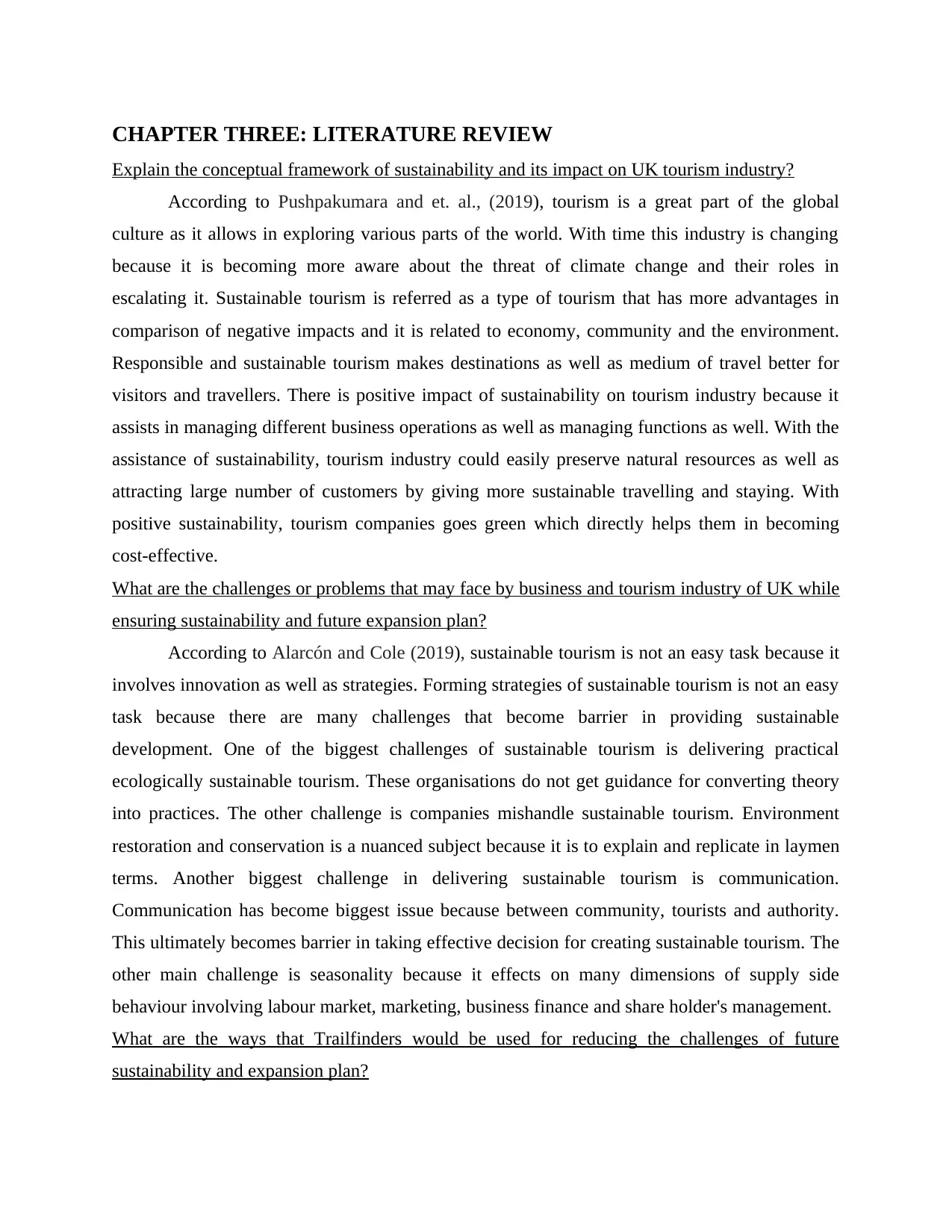
CHAPTER THREE: LITERATURE REVIEW
Explain the conceptual framework of sustainability and its impact on UK tourism industry?
According to Pushpakumara and et. al., (2019), tourism is a great part of the global
culture as it allows in exploring various parts of the world. With time this industry is changing
because it is becoming more aware about the threat of climate change and their roles in
escalating it. Sustainable tourism is referred as a type of tourism that has more advantages in
comparison of negative impacts and it is related to economy, community and the environment.
Responsible and sustainable tourism makes destinations as well as medium of travel better for
visitors and travellers. There is positive impact of sustainability on tourism industry because it
assists in managing different business operations as well as managing functions as well. With the
assistance of sustainability, tourism industry could easily preserve natural resources as well as
attracting large number of customers by giving more sustainable travelling and staying. With
positive sustainability, tourism companies goes green which directly helps them in becoming
cost-effective.
What are the challenges or problems that may face by business and tourism industry of UK while
ensuring sustainability and future expansion plan?
According to Alarcón and Cole (2019), sustainable tourism is not an easy task because it
involves innovation as well as strategies. Forming strategies of sustainable tourism is not an easy
task because there are many challenges that become barrier in providing sustainable
development. One of the biggest challenges of sustainable tourism is delivering practical
ecologically sustainable tourism. These organisations do not get guidance for converting theory
into practices. The other challenge is companies mishandle sustainable tourism. Environment
restoration and conservation is a nuanced subject because it is to explain and replicate in laymen
terms. Another biggest challenge in delivering sustainable tourism is communication.
Communication has become biggest issue because between community, tourists and authority.
This ultimately becomes barrier in taking effective decision for creating sustainable tourism. The
other main challenge is seasonality because it effects on many dimensions of supply side
behaviour involving labour market, marketing, business finance and share holder's management.
What are the ways that Trailfinders would be used for reducing the challenges of future
sustainability and expansion plan?
Explain the conceptual framework of sustainability and its impact on UK tourism industry?
According to Pushpakumara and et. al., (2019), tourism is a great part of the global
culture as it allows in exploring various parts of the world. With time this industry is changing
because it is becoming more aware about the threat of climate change and their roles in
escalating it. Sustainable tourism is referred as a type of tourism that has more advantages in
comparison of negative impacts and it is related to economy, community and the environment.
Responsible and sustainable tourism makes destinations as well as medium of travel better for
visitors and travellers. There is positive impact of sustainability on tourism industry because it
assists in managing different business operations as well as managing functions as well. With the
assistance of sustainability, tourism industry could easily preserve natural resources as well as
attracting large number of customers by giving more sustainable travelling and staying. With
positive sustainability, tourism companies goes green which directly helps them in becoming
cost-effective.
What are the challenges or problems that may face by business and tourism industry of UK while
ensuring sustainability and future expansion plan?
According to Alarcón and Cole (2019), sustainable tourism is not an easy task because it
involves innovation as well as strategies. Forming strategies of sustainable tourism is not an easy
task because there are many challenges that become barrier in providing sustainable
development. One of the biggest challenges of sustainable tourism is delivering practical
ecologically sustainable tourism. These organisations do not get guidance for converting theory
into practices. The other challenge is companies mishandle sustainable tourism. Environment
restoration and conservation is a nuanced subject because it is to explain and replicate in laymen
terms. Another biggest challenge in delivering sustainable tourism is communication.
Communication has become biggest issue because between community, tourists and authority.
This ultimately becomes barrier in taking effective decision for creating sustainable tourism. The
other main challenge is seasonality because it effects on many dimensions of supply side
behaviour involving labour market, marketing, business finance and share holder's management.
What are the ways that Trailfinders would be used for reducing the challenges of future
sustainability and expansion plan?
⊘ This is a preview!⊘
Do you want full access?
Subscribe today to unlock all pages.

Trusted by 1+ million students worldwide
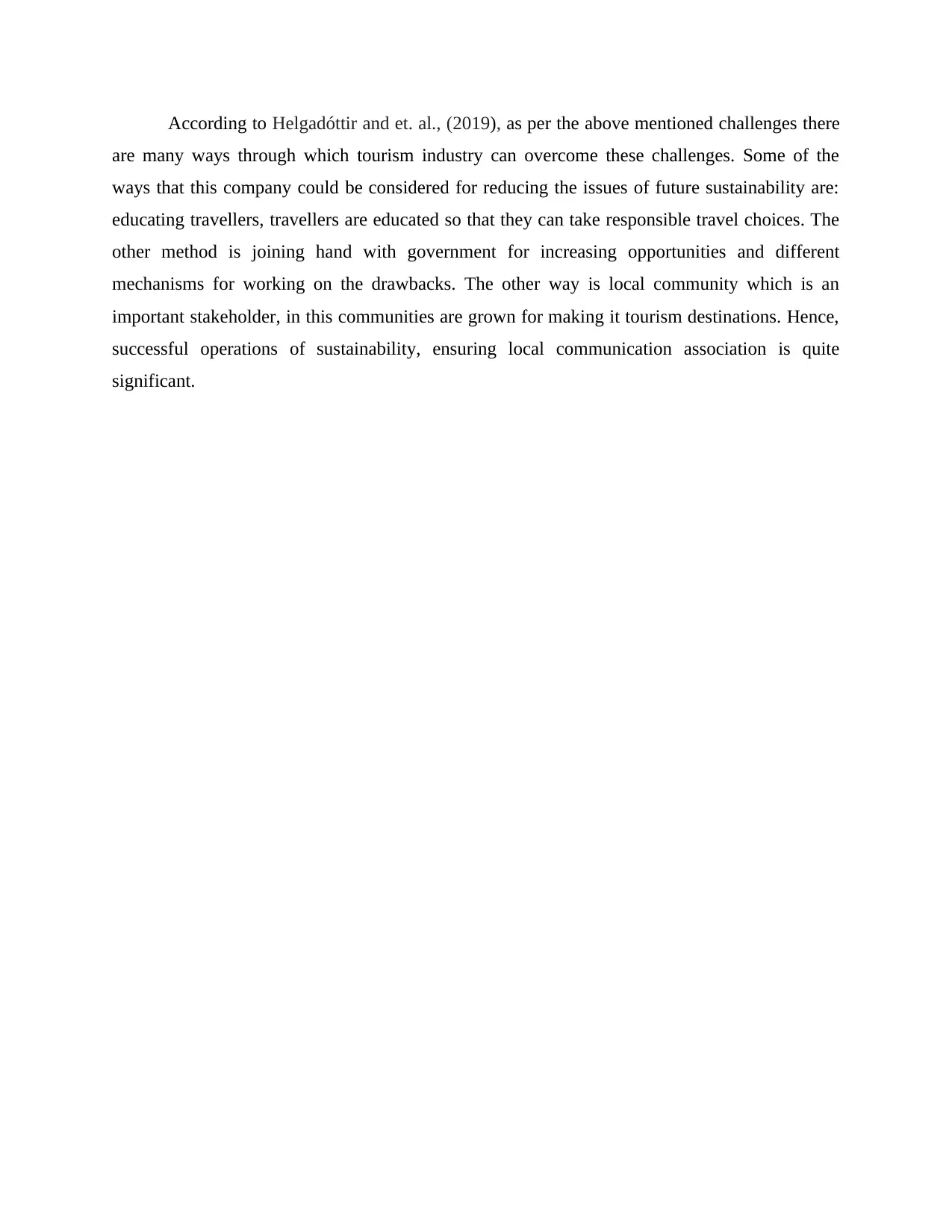
According to Helgadóttir and et. al., (2019), as per the above mentioned challenges there
are many ways through which tourism industry can overcome these challenges. Some of the
ways that this company could be considered for reducing the issues of future sustainability are:
educating travellers, travellers are educated so that they can take responsible travel choices. The
other method is joining hand with government for increasing opportunities and different
mechanisms for working on the drawbacks. The other way is local community which is an
important stakeholder, in this communities are grown for making it tourism destinations. Hence,
successful operations of sustainability, ensuring local communication association is quite
significant.
are many ways through which tourism industry can overcome these challenges. Some of the
ways that this company could be considered for reducing the issues of future sustainability are:
educating travellers, travellers are educated so that they can take responsible travel choices. The
other method is joining hand with government for increasing opportunities and different
mechanisms for working on the drawbacks. The other way is local community which is an
important stakeholder, in this communities are grown for making it tourism destinations. Hence,
successful operations of sustainability, ensuring local communication association is quite
significant.
Paraphrase This Document
Need a fresh take? Get an instant paraphrase of this document with our AI Paraphraser
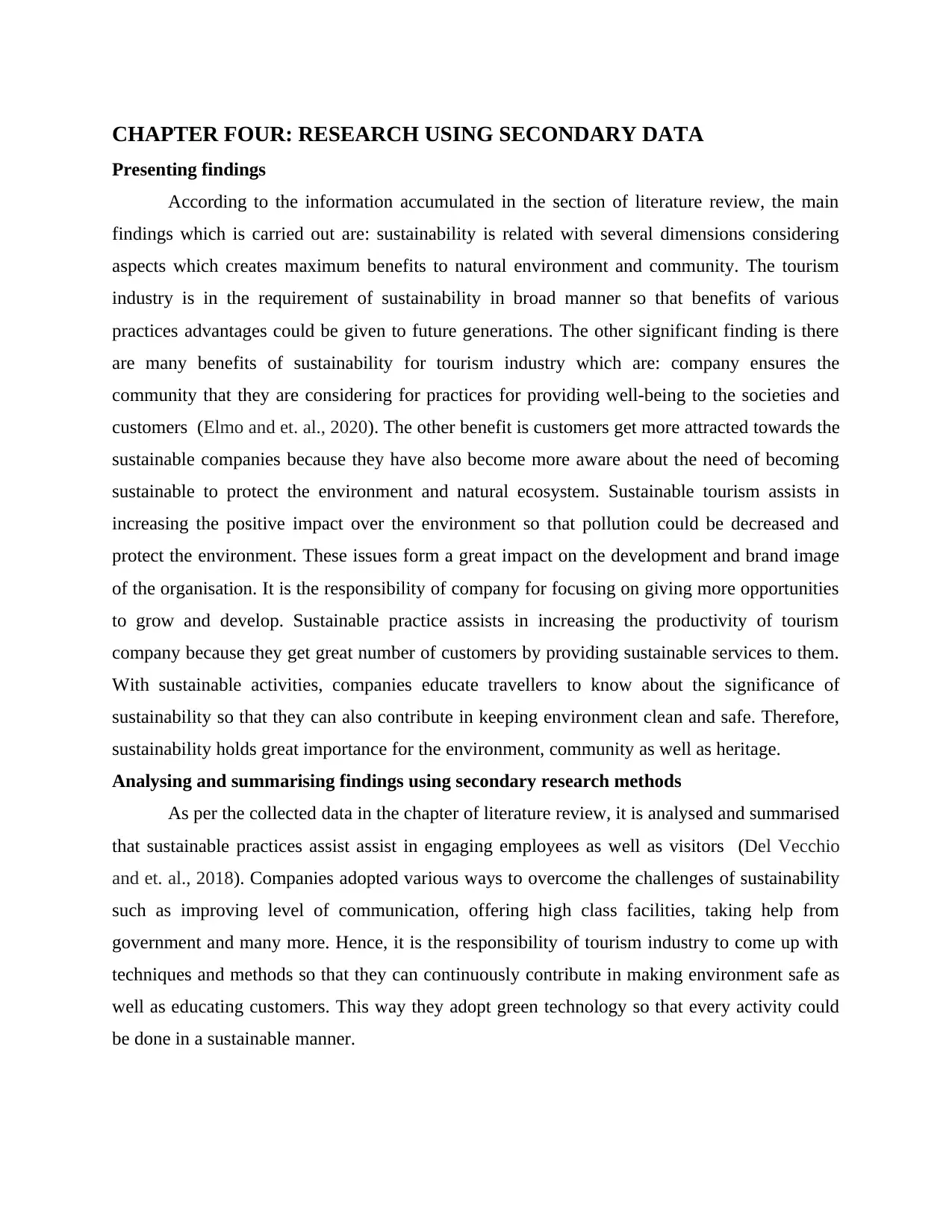
CHAPTER FOUR: RESEARCH USING SECONDARY DATA
Presenting findings
According to the information accumulated in the section of literature review, the main
findings which is carried out are: sustainability is related with several dimensions considering
aspects which creates maximum benefits to natural environment and community. The tourism
industry is in the requirement of sustainability in broad manner so that benefits of various
practices advantages could be given to future generations. The other significant finding is there
are many benefits of sustainability for tourism industry which are: company ensures the
community that they are considering for practices for providing well-being to the societies and
customers (Elmo and et. al., 2020). The other benefit is customers get more attracted towards the
sustainable companies because they have also become more aware about the need of becoming
sustainable to protect the environment and natural ecosystem. Sustainable tourism assists in
increasing the positive impact over the environment so that pollution could be decreased and
protect the environment. These issues form a great impact on the development and brand image
of the organisation. It is the responsibility of company for focusing on giving more opportunities
to grow and develop. Sustainable practice assists in increasing the productivity of tourism
company because they get great number of customers by providing sustainable services to them.
With sustainable activities, companies educate travellers to know about the significance of
sustainability so that they can also contribute in keeping environment clean and safe. Therefore,
sustainability holds great importance for the environment, community as well as heritage.
Analysing and summarising findings using secondary research methods
As per the collected data in the chapter of literature review, it is analysed and summarised
that sustainable practices assist assist in engaging employees as well as visitors (Del Vecchio
and et. al., 2018). Companies adopted various ways to overcome the challenges of sustainability
such as improving level of communication, offering high class facilities, taking help from
government and many more. Hence, it is the responsibility of tourism industry to come up with
techniques and methods so that they can continuously contribute in making environment safe as
well as educating customers. This way they adopt green technology so that every activity could
be done in a sustainable manner.
Presenting findings
According to the information accumulated in the section of literature review, the main
findings which is carried out are: sustainability is related with several dimensions considering
aspects which creates maximum benefits to natural environment and community. The tourism
industry is in the requirement of sustainability in broad manner so that benefits of various
practices advantages could be given to future generations. The other significant finding is there
are many benefits of sustainability for tourism industry which are: company ensures the
community that they are considering for practices for providing well-being to the societies and
customers (Elmo and et. al., 2020). The other benefit is customers get more attracted towards the
sustainable companies because they have also become more aware about the need of becoming
sustainable to protect the environment and natural ecosystem. Sustainable tourism assists in
increasing the positive impact over the environment so that pollution could be decreased and
protect the environment. These issues form a great impact on the development and brand image
of the organisation. It is the responsibility of company for focusing on giving more opportunities
to grow and develop. Sustainable practice assists in increasing the productivity of tourism
company because they get great number of customers by providing sustainable services to them.
With sustainable activities, companies educate travellers to know about the significance of
sustainability so that they can also contribute in keeping environment clean and safe. Therefore,
sustainability holds great importance for the environment, community as well as heritage.
Analysing and summarising findings using secondary research methods
As per the collected data in the chapter of literature review, it is analysed and summarised
that sustainable practices assist assist in engaging employees as well as visitors (Del Vecchio
and et. al., 2018). Companies adopted various ways to overcome the challenges of sustainability
such as improving level of communication, offering high class facilities, taking help from
government and many more. Hence, it is the responsibility of tourism industry to come up with
techniques and methods so that they can continuously contribute in making environment safe as
well as educating customers. This way they adopt green technology so that every activity could
be done in a sustainable manner.
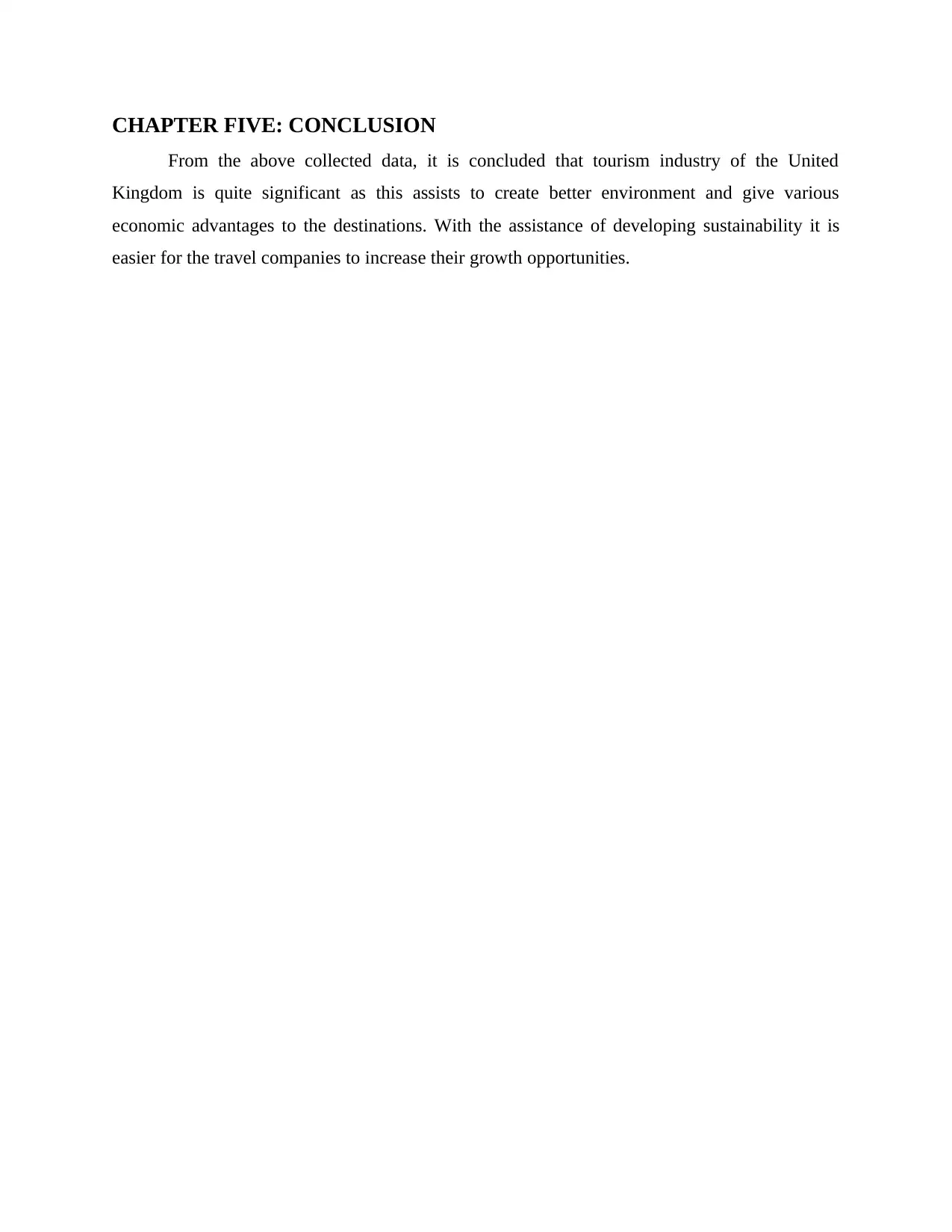
CHAPTER FIVE: CONCLUSION
From the above collected data, it is concluded that tourism industry of the United
Kingdom is quite significant as this assists to create better environment and give various
economic advantages to the destinations. With the assistance of developing sustainability it is
easier for the travel companies to increase their growth opportunities.
From the above collected data, it is concluded that tourism industry of the United
Kingdom is quite significant as this assists to create better environment and give various
economic advantages to the destinations. With the assistance of developing sustainability it is
easier for the travel companies to increase their growth opportunities.
⊘ This is a preview!⊘
Do you want full access?
Subscribe today to unlock all pages.

Trusted by 1+ million students worldwide
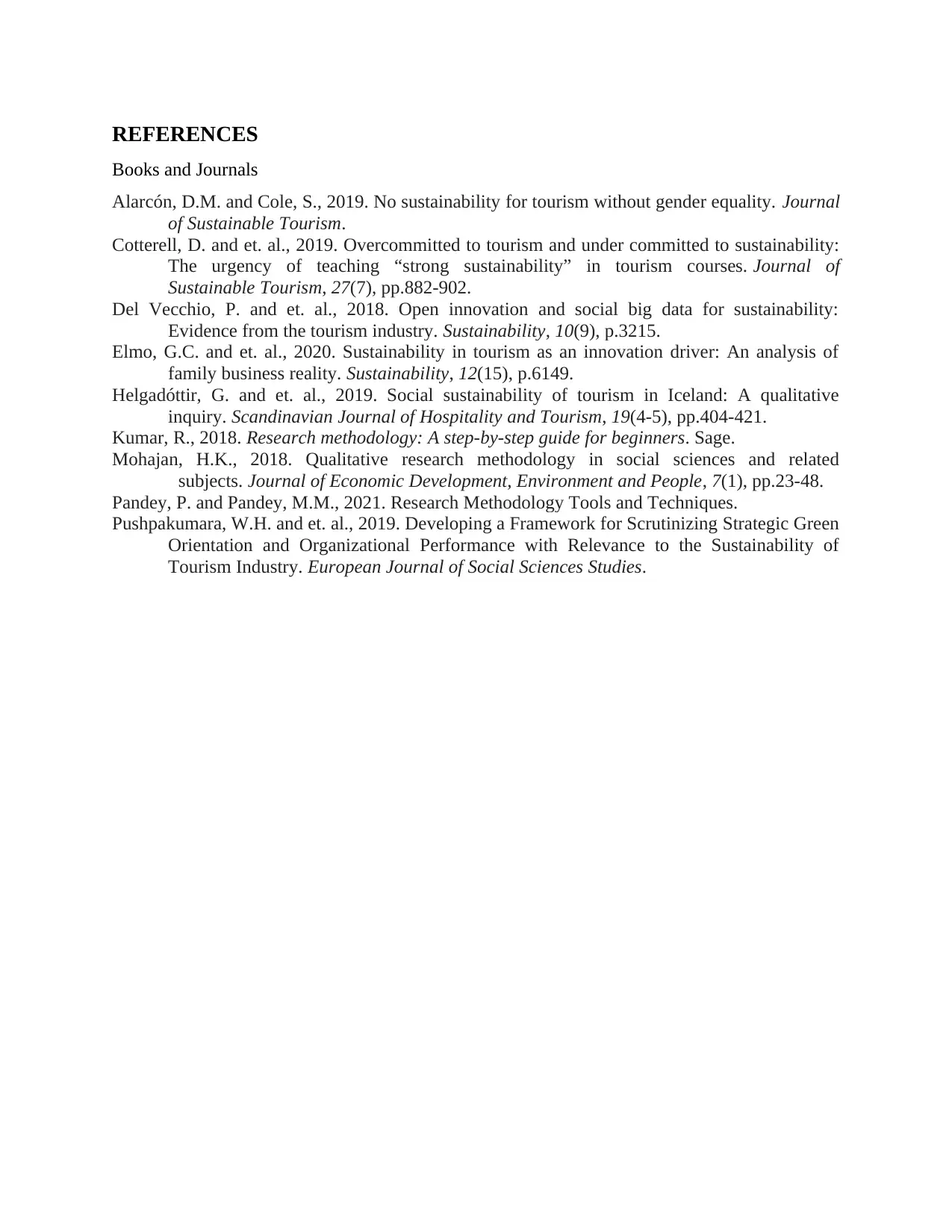
REFERENCES
Books and Journals
Alarcón, D.M. and Cole, S., 2019. No sustainability for tourism without gender equality. Journal
of Sustainable Tourism.
Cotterell, D. and et. al., 2019. Overcommitted to tourism and under committed to sustainability:
The urgency of teaching “strong sustainability” in tourism courses. Journal of
Sustainable Tourism, 27(7), pp.882-902.
Del Vecchio, P. and et. al., 2018. Open innovation and social big data for sustainability:
Evidence from the tourism industry. Sustainability, 10(9), p.3215.
Elmo, G.C. and et. al., 2020. Sustainability in tourism as an innovation driver: An analysis of
family business reality. Sustainability, 12(15), p.6149.
Helgadóttir, G. and et. al., 2019. Social sustainability of tourism in Iceland: A qualitative
inquiry. Scandinavian Journal of Hospitality and Tourism, 19(4-5), pp.404-421.
Kumar, R., 2018. Research methodology: A step-by-step guide for beginners. Sage.
Mohajan, H.K., 2018. Qualitative research methodology in social sciences and related
subjects. Journal of Economic Development, Environment and People, 7(1), pp.23-48.
Pandey, P. and Pandey, M.M., 2021. Research Methodology Tools and Techniques.
Pushpakumara, W.H. and et. al., 2019. Developing a Framework for Scrutinizing Strategic Green
Orientation and Organizational Performance with Relevance to the Sustainability of
Tourism Industry. European Journal of Social Sciences Studies.
Books and Journals
Alarcón, D.M. and Cole, S., 2019. No sustainability for tourism without gender equality. Journal
of Sustainable Tourism.
Cotterell, D. and et. al., 2019. Overcommitted to tourism and under committed to sustainability:
The urgency of teaching “strong sustainability” in tourism courses. Journal of
Sustainable Tourism, 27(7), pp.882-902.
Del Vecchio, P. and et. al., 2018. Open innovation and social big data for sustainability:
Evidence from the tourism industry. Sustainability, 10(9), p.3215.
Elmo, G.C. and et. al., 2020. Sustainability in tourism as an innovation driver: An analysis of
family business reality. Sustainability, 12(15), p.6149.
Helgadóttir, G. and et. al., 2019. Social sustainability of tourism in Iceland: A qualitative
inquiry. Scandinavian Journal of Hospitality and Tourism, 19(4-5), pp.404-421.
Kumar, R., 2018. Research methodology: A step-by-step guide for beginners. Sage.
Mohajan, H.K., 2018. Qualitative research methodology in social sciences and related
subjects. Journal of Economic Development, Environment and People, 7(1), pp.23-48.
Pandey, P. and Pandey, M.M., 2021. Research Methodology Tools and Techniques.
Pushpakumara, W.H. and et. al., 2019. Developing a Framework for Scrutinizing Strategic Green
Orientation and Organizational Performance with Relevance to the Sustainability of
Tourism Industry. European Journal of Social Sciences Studies.
1 out of 10
Related Documents
Your All-in-One AI-Powered Toolkit for Academic Success.
+13062052269
info@desklib.com
Available 24*7 on WhatsApp / Email
![[object Object]](/_next/static/media/star-bottom.7253800d.svg)
Unlock your academic potential
Copyright © 2020–2026 A2Z Services. All Rights Reserved. Developed and managed by ZUCOL.





